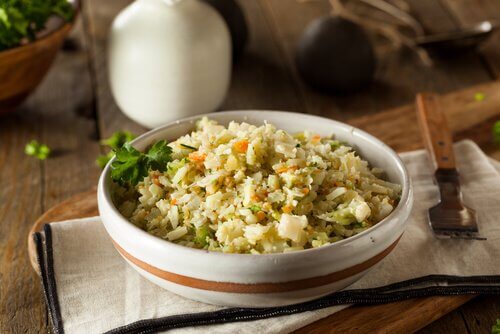Irritable Bowel Syndrome in Children

Irritable bowel syndrome in children is a common intestinal disorder that can appear at a young age. In these cases, a mother can take some concrete, simple actions to facilitate a rapid recovery without any complications for the child.
Irritable bowel syndrome in children appears as a result of eating foods that have lactose, fat, spicy elements, and flour, among other things. Children who have been breast-fed will be more exposed to these disorders.
Summer is an important stage to consider with regard to nutrition. During those months, children’s digestive tolerance is lower, just as during other seasons there are more infections going around.
Irritable bowel syndrome in children has been connected to important psychological factors such as stress and nervousness. Similarly, many link it to hormonal imbalances, food intolerance, genetic predisposition, or changes in intestinal mucous.
Symptoms of irritable bowel syndrome in children
Irritable bowel syndrome in children is a disorder that can be recurrent or even become chronic. The causes are unknown. Among the various symptoms that can occur are the following:
- Gas
- Abdominal pain
- Diarrhea
- Vomiting
- Intestinal distention
- Constipation
- Pain during or after defecating
What you should know about symptoms of irritable bowel syndrome children
When your child has diarrhea or is vomiting, immediately re-hydrate your child with electrolyte-rich drinks recommended by your pediatrician.
This simple measure not only completes the first step of the doctor’s treatment, but also avoids harm to the patient.
It’s important to know that you should never give laxatives to your child, nor prepared milks or astringents unless directed by a medical specialist.

On the other hand, avoid any type of irrigation or cleanse. It’s better to give children food and medication they’re prescribed with a spoon, especially if the child is still nursing.
If the condition recurs, it isn’t a good idea to go on long diets. If you’re putting your child on a special diet, the first should only last 12 to 24 hours. In that interval, give your child plenty of warm or cold water – ice, if they’re vomiting.
The characteristics of children’s stool are less important for diagnosis and monitoring this process. However, it’s always a good idea to hold on to the last dirty diaper until there is a new one, just in case the doctor wants to look at it.
When children are constipated or experiencing intestinal laziness, the best way to solve it is with a specific diet. A high-quality diet focused on avoiding constipation can correct or even cure this dangerous tendency, which is sometimes innate.
“Irritable bowel syndrome in children presents as a result of ingesting foods that contain lactose, fats, spicy elements, and flour, among others.”
Nutritional regimes for irritable bowel syndrome in children
Below you’ll find a few special dishes for children who are experiencing irritable bowel syndrome. It’s incredibly important to note that these are general recommendations. You should always check with a medical specialist first.
Stewed carrots
Ingredients
- 1 pound of carrots
- 6 table spoons of water
- 2 tablespoons of olive oil
- salt to taste
Preparation
- Wash the carrots and slice them
- Put the water and salt in a pan and leave the carrots to cook, covered, for 30 minutes.
Rice and spinach
Ingredients
- 1/2 cup rice
- 1 cup water
- 1/2 pound of spinach
- 1 tablespoon olive oil
- 1 tablespoon bread crumbs
- 3 cups water
- Salt to taste
Preparation
- Boil the rice in the water with salt until it’s dry.
- Cut the spinach and heat the oil in a pan. Next, add the spinach and a small amount of water and cook for ten minutes.
- Oil a pan and put the rice in, pushing it to the edges to form a circle.
- Fill the space in the middle with the spinach, pour a little oil on top, and finally, sprinkle with breadcrumbs.
- Cook in the oven for ten minutes.

Rye puree
Ingredients
- 2 tablespoons of whole rye grain
- 1 tablespoons honey
- 2 large cups of water
Preparation
- Put the grain and the honey in the water, leave it to cook over a low flame for 30 minutes.
- As it boils, you can add non-acidic fruit juices.
Our children’s nutrition should be based on foods that are easy to digest. We must completely avoid food that contains condiments, acidic fruits, or foods with too much fiber.
Finally, it’s also not good to make abrupt changes in children’s diets. It’s always a good idea to wait for advice from a specialist. Abrupt changes in diet can, rather than helping infants, bring more intestinal problems that will be hard to shake.
Irritable bowel syndrome in children is a common intestinal disorder that can appear at a young age. In these cases, a mother can take some concrete, simple actions to facilitate a rapid recovery without any complications for the child.
Irritable bowel syndrome in children appears as a result of eating foods that have lactose, fat, spicy elements, and flour, among other things. Children who have been breast-fed will be more exposed to these disorders.
Summer is an important stage to consider with regard to nutrition. During those months, children’s digestive tolerance is lower, just as during other seasons there are more infections going around.
Irritable bowel syndrome in children has been connected to important psychological factors such as stress and nervousness. Similarly, many link it to hormonal imbalances, food intolerance, genetic predisposition, or changes in intestinal mucous.
Symptoms of irritable bowel syndrome in children
Irritable bowel syndrome in children is a disorder that can be recurrent or even become chronic. The causes are unknown. Among the various symptoms that can occur are the following:
- Gas
- Abdominal pain
- Diarrhea
- Vomiting
- Intestinal distention
- Constipation
- Pain during or after defecating
What you should know about symptoms of irritable bowel syndrome children
When your child has diarrhea or is vomiting, immediately re-hydrate your child with electrolyte-rich drinks recommended by your pediatrician.
This simple measure not only completes the first step of the doctor’s treatment, but also avoids harm to the patient.
It’s important to know that you should never give laxatives to your child, nor prepared milks or astringents unless directed by a medical specialist.

On the other hand, avoid any type of irrigation or cleanse. It’s better to give children food and medication they’re prescribed with a spoon, especially if the child is still nursing.
If the condition recurs, it isn’t a good idea to go on long diets. If you’re putting your child on a special diet, the first should only last 12 to 24 hours. In that interval, give your child plenty of warm or cold water – ice, if they’re vomiting.
The characteristics of children’s stool are less important for diagnosis and monitoring this process. However, it’s always a good idea to hold on to the last dirty diaper until there is a new one, just in case the doctor wants to look at it.
When children are constipated or experiencing intestinal laziness, the best way to solve it is with a specific diet. A high-quality diet focused on avoiding constipation can correct or even cure this dangerous tendency, which is sometimes innate.
“Irritable bowel syndrome in children presents as a result of ingesting foods that contain lactose, fats, spicy elements, and flour, among others.”
Nutritional regimes for irritable bowel syndrome in children
Below you’ll find a few special dishes for children who are experiencing irritable bowel syndrome. It’s incredibly important to note that these are general recommendations. You should always check with a medical specialist first.
Stewed carrots
Ingredients
- 1 pound of carrots
- 6 table spoons of water
- 2 tablespoons of olive oil
- salt to taste
Preparation
- Wash the carrots and slice them
- Put the water and salt in a pan and leave the carrots to cook, covered, for 30 minutes.
Rice and spinach
Ingredients
- 1/2 cup rice
- 1 cup water
- 1/2 pound of spinach
- 1 tablespoon olive oil
- 1 tablespoon bread crumbs
- 3 cups water
- Salt to taste
Preparation
- Boil the rice in the water with salt until it’s dry.
- Cut the spinach and heat the oil in a pan. Next, add the spinach and a small amount of water and cook for ten minutes.
- Oil a pan and put the rice in, pushing it to the edges to form a circle.
- Fill the space in the middle with the spinach, pour a little oil on top, and finally, sprinkle with breadcrumbs.
- Cook in the oven for ten minutes.

Rye puree
Ingredients
- 2 tablespoons of whole rye grain
- 1 tablespoons honey
- 2 large cups of water
Preparation
- Put the grain and the honey in the water, leave it to cook over a low flame for 30 minutes.
- As it boils, you can add non-acidic fruit juices.
Our children’s nutrition should be based on foods that are easy to digest. We must completely avoid food that contains condiments, acidic fruits, or foods with too much fiber.
Finally, it’s also not good to make abrupt changes in children’s diets. It’s always a good idea to wait for advice from a specialist. Abrupt changes in diet can, rather than helping infants, bring more intestinal problems that will be hard to shake.
All cited sources were thoroughly reviewed by our team to ensure their quality, reliability, currency, and validity. The bibliography of this article was considered reliable and of academic or scientific accuracy.
- Yeh, A. M., Wren, A., & Golianu, B. (2017). Mind–Body Interventions for Pediatric Inflammatory Bowel Disease. Children. https://doi.org/10.3390/children4040022
- Claßen, M. (2018). Irritable bowel syndrome in children and adolescents. Monatsschrift Fur Kinderheilkunde. https://doi.org/10.1007/s00112-018-0455-9
This text is provided for informational purposes only and does not replace consultation with a professional. If in doubt, consult your specialist.








